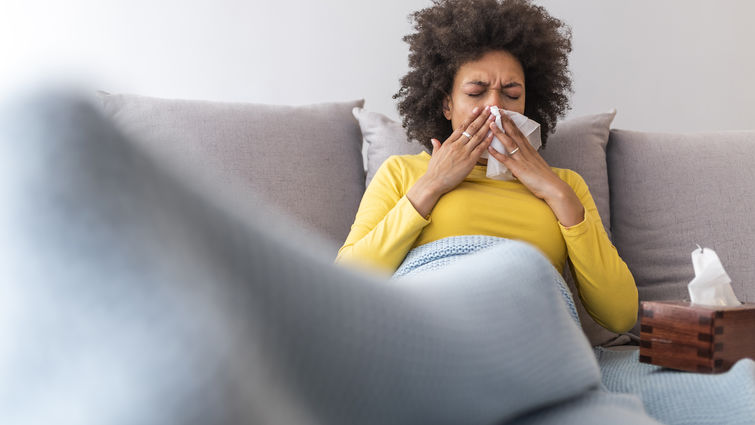
Allergy and asthma
With allergy season overlapping the COVID-19 pandemic this spring, a runny nose or scratchy throat can cause panic and concern of a greater, more severe issue. COVID-19 can cause life-threatening symptoms, but the majority of people who contract the virus will experience mild to moderate symptoms.
Laren D. Tan, MD, a pulmonologist at Loma Linda University Health, says many patients who suffer from allergies may have difficulty distinguishing between allergy symptoms and COVID-19 symptoms.
Tan offers advice on how to tell the difference between a virus and allergies:
Viruses and our body
A virus is an infectious agent that can only replicate inside the living cells of an organism.
“Imagine in a movie, an enemy ship docks or attaches to another ship, and the bad guys enter the vulnerable ship and take over,” Tan says. “This is similarly how a virus infects our cells.”
Viruses can remain viable on surfaces for hours to days, depending if the surface is porous with nooks and crevices to hide, Tan says. “Cleaning high-risk areas for spreading infection — such as door handles or grocery carts — is necessary to slow the spread of any virus,” he says.
Like other viruses, COVID-19 circulates through droplets in the air spread by coughing or sneezing and enters the body through the mouth, eyes or nose.
Symptoms of COVID
COVID-19 can affect people in different ways, but most infected people will develop mild to moderate symptoms.
Tan says the most common symptoms include:
- Fever
- Coughing
- Shortness of breath
Although the above are the most common symptoms, Tan says there have been a wide range of symptoms reported, including:
- Chills
- Consistent shaking with chills
- Muscle pain
- Headache
- Sore throat
- New loss of taste or smell
On average, the Centers for Disease Control and Prevention says it takes 5–6 days from when someone is infected with the virus for symptoms to show. However, it can take up to 14 days.
“People with mild symptoms who are otherwise healthy should self-isolate,” he says. “If you have a fever, cough and difficulty breathing, call your physician, and get help as soon as possible.”
Distinguishing between COVID-19 and other respiratory concerns
It can be challenging to differentiate between COVID-19, seasonal flu, allergies and the common cold, since symptoms of COVID-19 may overlap with symptoms prevalent in the spring, Tan says.
“Typical symptoms of seasonal allergies include itchy eyes, itchy nose, sneezing, runny nose and post-nasal drip, while symptoms of COVID-19 include fever, cough, shortness of breath, fatigue, muscle aches, and sometimes, a sore throat,” Tan says.
The big difference between symptoms of allergies and COVID-19 are the itchy symptoms, such as itchy eyes, itchy nose or sneezing. “If you are experiencing these types of symptoms, they are most likely due to environmental allergies and not COVID-19,” Tan says.
“Asthma can also make you more susceptible to having more severe symptoms of COVID-19,” Tan says. “So, it is essential to have an up-to-date action plan for both your allergies and for your asthma.”
Patients who have chronic respiratory conditions like asthma and COPD can at times have what is called a disruption of their epithelial lining — or damage to the cellular barrier that helps to protect the lungs — making it easier for viruses and illnesses to invade the rest of the body, which makes them more prone to infection.
“It can be tough to differentiate between respiratory viruses based on symptoms alone since many share similar — if not identical — symptoms,” Tan says. “That’s why we stress the importance of telling your healthcare provider the things they can’t see, like to where you’ve traveled, what you’ve eaten or who you’ve spent time with recently.”
To minimize spring allergy symptoms, Tan recommends avoiding allergens. “Keep windows closed, rinse off or change clothes after being outside, and be vigilant in taking prescribed medications and using inhalers,” he says. “Many of the restrictions for preventing the spread of the coronavirus, like staying at home, can also help minimize allergy and asthma symptoms this spring.”
To learn more about the lung treatment options at Loma Linda University Health, visit our Advanced Lung Disease Center. For COPD or asthma treatments, see your primary care physician for a referral. Contact Loma Linda University Primary Care at 909-558-6600 or schedule an appointment online at MyChart.
